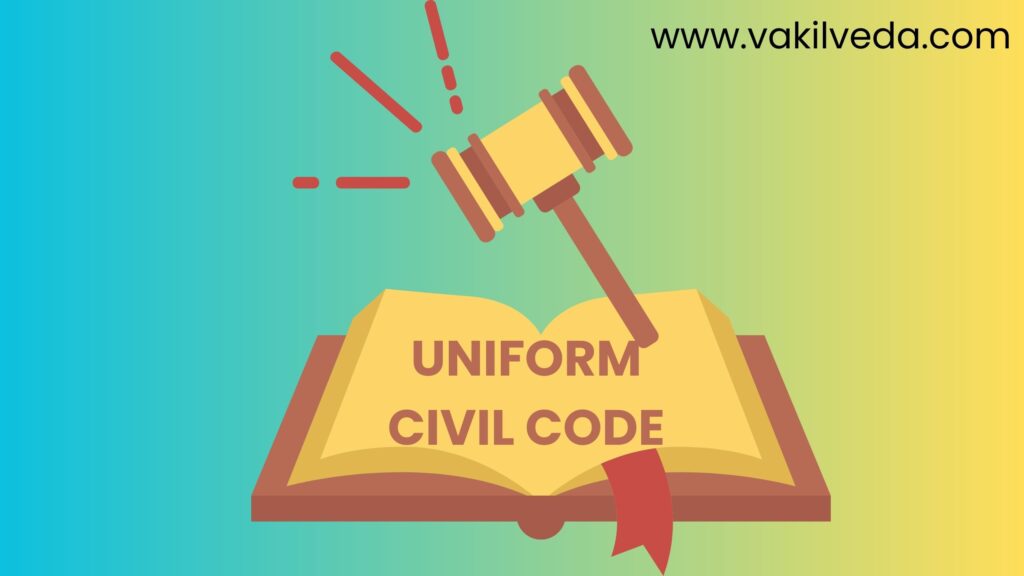
By Uniform Civil Code, it is meant that the Civil laws (Personal Laws like marriage, divorce, adoption etc.) shall be the same for all citizens irrespective of their religious belief. It aims to have a uniform legal framework that is meant to be available to all citizens equally irrespective of their religion. The term Uniform Civil Code has not been defined under the Indian Constitution or any other statute.
Uniform Civil Code under the Indian Constitution-
Article 44– Uniform civil code for citizens – The state shall endeavour to secure for the citizens a uniform civil code throughout the territory of India.
The provision concerning UCC has been incorporated in the Directive Principles of State Policy (Part- IV) under Article 44 of the Constitution of India. As per this Article, the state shall endeavour to secure for the citizens a uniform civil code throughout the territory of India. Now, it can be said that this Article says that within the territory of India, the state will have to put effort to bring UCC into existence uniform civil code.
Constituent Assembly on Uniform Civil Code-
Like other matters, UCC was also discussed in the Constituent Assembly very exhaustively. Many members in the Assembly were opposing the UCC and many were in support of the same. Both those who were in support and those who were opposing have their point of concern.
An objection was taken about bringing the provision for UCC, by several Muslim members who apprehended that their personal law might be abrogated. This objection was met up by pointing out:
- That India had already achieved a uniformity of law over a vast area,
- Though there was diversity in personal laws, there was nothing sacrosanct about them,
- The secular activities, such as inheritance, covered by personal laws should be separated from religion
- That a uniform law applicable to all would promote national unity, and
- That no legislature would forcibly amend any personal law in future if people were opposed to it.
Steps taken towards UCC-
Till now not much progress has been seen towards bringing UCC. Although the Bhartiya Janta Party has come into power in the Central UCC has again come into the limelight. Before 2014 it was considered a distant dream. The only major step taken towards the UCC has been the codification and secularisation of Hindu Law. The codification of Muslim Law remains a very sensitive matter.
Indian Courts on UCC-
Reviewing the various laws relating to marriage in India, the Supreme Court has said in Ms. Jorden Diengdeh vs. S.S.Chopra (AIR 1985 SC 934, 940 : (1985) 3 SCC 62) “….the law relating to judicial separation, divorce and nullity of marriage is far, far from uniform. Surely the time has now come for a complete reform of the law of marriage and make a uniform law applicable to all people irrespective of religion and caste…. We suggest that the time has come for the intervention of the legislature in these matters to provide for a uniform code of marriage and divorce ……”
Again in Mohd. Ahmed Khan vs. Shah Bano Begum (AIR 1985 SC 945, 954 : (1985) 2 SCC 556) the Supreme Court has ruled that a Muslim husband is liable to pay maintenance to a divorced wife beyond the iddat period. The court has regretted that Article 44 has remained a “dead letter” as there is “no evidence of any official activity for framing a common civil code for the country”. The court has emphasised, “A common civil code will help the cause of national integration by removing disparate loyalties to laws which have conflicting ideologies”.
These are not only two or three instances, there are millions of instances be it the case of Daniel Latifi or Sarla Mudgal (1995) or John Vallamattom (2001), Paulo Coutinho (Paulo Coutinho vs. Maris Luzia Valentina Pereira, 2019) etc. But what do we have in hand from the Legislature? it has abandoned UCC. But even after all these efforts by the Judiciary the problems are still at their place and these problems could be eliminated only if a uniform law is made considering the dynamic social and economic realities objectivating towards uniformity. The Orthodox Muslims have characterised the efforts by the judiciary as anti-sharia while the liberals accept the efforts by the courts thinking them to be progressive.
Arguments in favour of UCC –
- It will promote national integration.
- It will remove the contradiction in society based on religion.
- It will also reduce unnecessary litigation.
- It will give more rights to women.
- It will help in reducing vote bank politics.
- It will also protect the human rights of the citizens. The reasoning behind this is that there are still some personal laws that are in contravention of the same.
- It will promote real secularism leaving behind pseudo-secularism.
- It will strengthen the legal system.
- It will also promote equality when all Indians will be treated like same.
Argument against UCC-
- It is considered a threat to Minority Rights which scares minorities.
Even after various suggestions on the part of the judiciary, the UCC can either be seen in the election manifesto or social media posts. When the election comes political parties and their supporters are going to support UCC. But there are others also who are opposing the same but they are opposing because supporters are from opposite parties. It would really be very excellent if we could seriously consider the need for a Uniform Civil Code.



Pingback: Cyber Kidnapping- Protect Yourself From Being a Victim -
Pingback: Section 5 of the Limitation Act apply before the DRT- M.P. High Court -